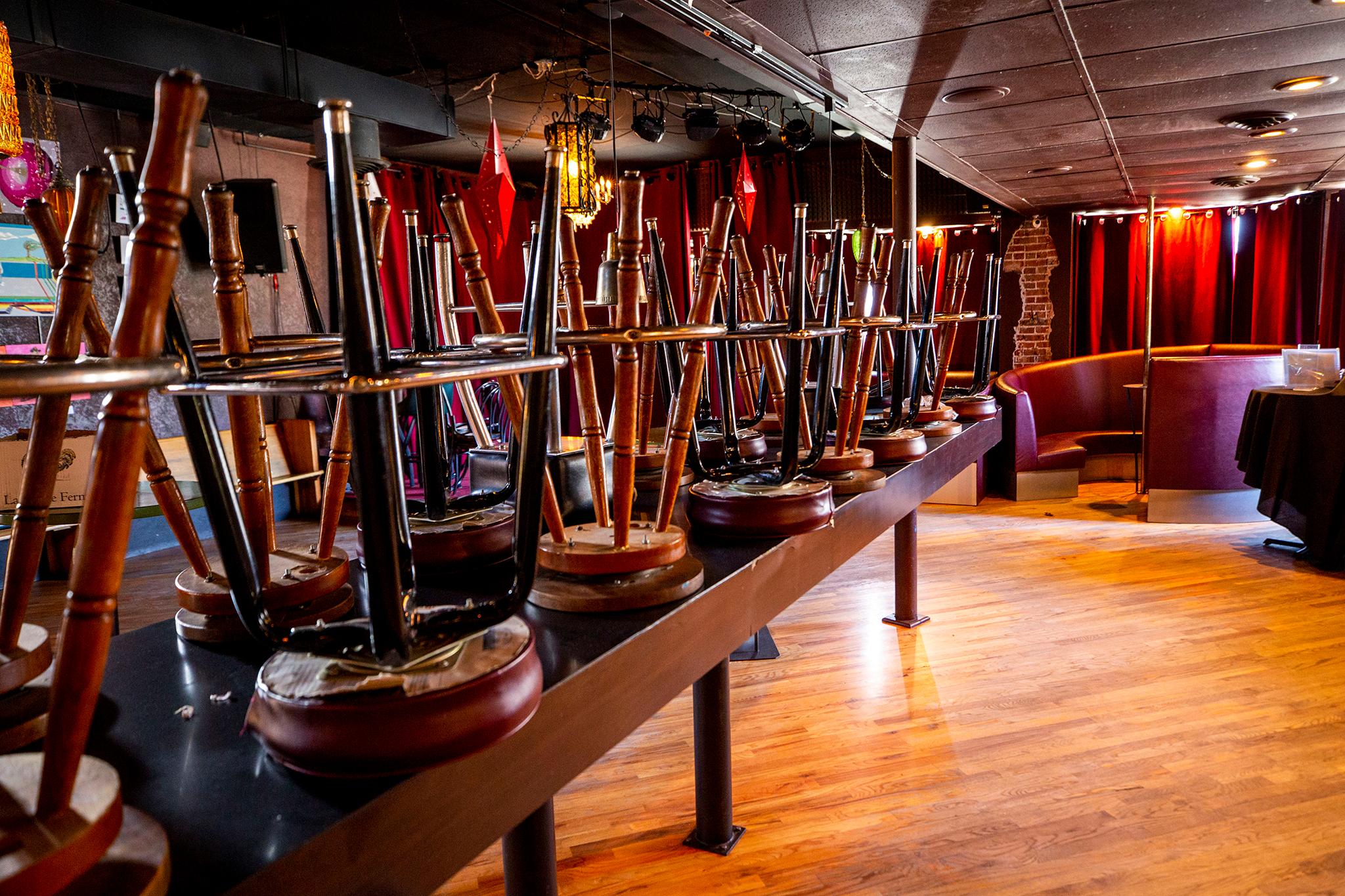It's difficult to say exactly how the pandemic impacted business in Denver, but data from the city's Department of Excise and Licenses gives us a look at what's happened over the last year.
Records show that there are 25 percent fewer active licenses for food sellers - including restaurants, caterers and food trucks - than in January 2020. We crunched numbers for some other industries, too.
Let's begin with some basic ground rules for the charts below:
1. Certain enterprises in the city must hold an "active" license to do business. You need a license, for instance, to sell food or liquor, to tattoo someone for money or to operate a pedicab.
2. Licenses stay active for a year and must be renewed. If a business owner calls it quits, she might not bother to cancel her license. Some of the businesses that closed recently, like LoDo's famous El Chapultepec, still technically have active licenses. So declines in the charts below likely underestimate overall losses to each sector. Newly activated licenses, however, are accounted for here.
3. Declines in a given industry do not reflect permanent closures. We spoke to business owners who told us they let their licenses lapse and may renew once it makes sense to get back to work. You can view declines as industries that hibernated over the last year. To be sure, some of those who dropped out may not opt back in once the pandemic dust settles.
4. All of these charts feature gaps. Excise and Licenses doesn't usually archive data throughout the year, but spokesman Eric Escudero said the department did begin to save this stuff more methodically when the pandemic began. They didn't get every month, but there's plenty here to see trends.
Food licenses are down 25 percent.
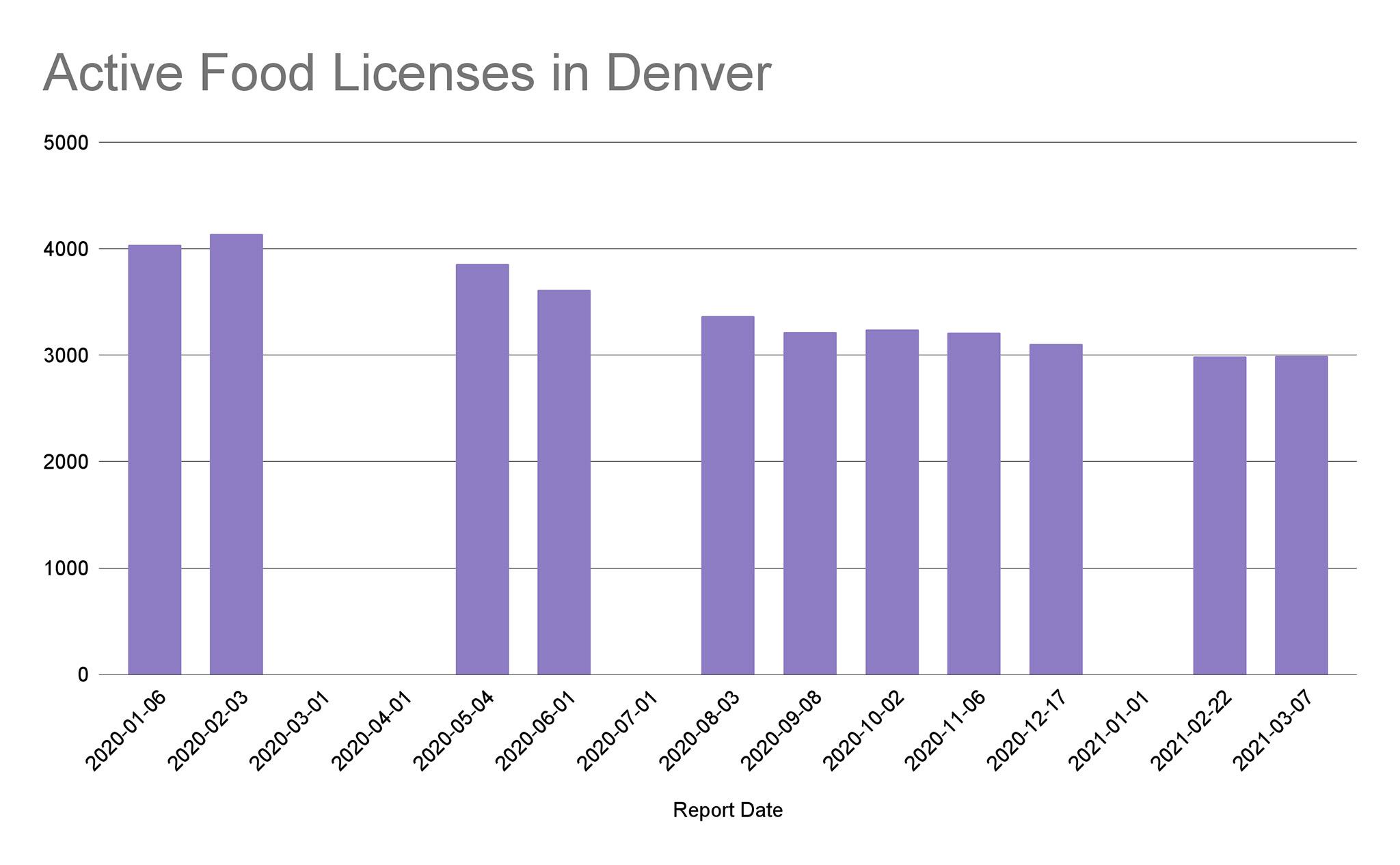
Source: Denver Department of Excise & Licenses
Again, this encompasses brick and mortar restaurants, food trucks, caterers, commissary kitchens and more.
Some of these declines do include restaurants that shuttered last year. Zaidy's Deli in Cherry Creek, for instance, was one closure that's reflected here. Zaidy's owner, Jason Rudofsky, told Westword that his decision to close his shop was related to the pandemic.
Still, we can't assume that all of these declines are directly related to COVID. Some of the expiring licenses reflected in this chart belonged to restaurants that closed before the pandemic, but their licenses only recently lost their active statuses.
One more caveat: We spoke to some business owners whose licenses became inactive and were later re-activated. Jacqueline Bonanno, one of the owners of Highland's Salt & Grinder, told us that restaurant's momentary lapse in September had to do with a slow renewal on the city's end. Escudero and his team confirmed that the department faced backlogs as they scrambled to get restaurants registered for Denver's new expanded patio program, and they were behind on some renewals last fall.
"Mobile" food licenses are down 22 percent.
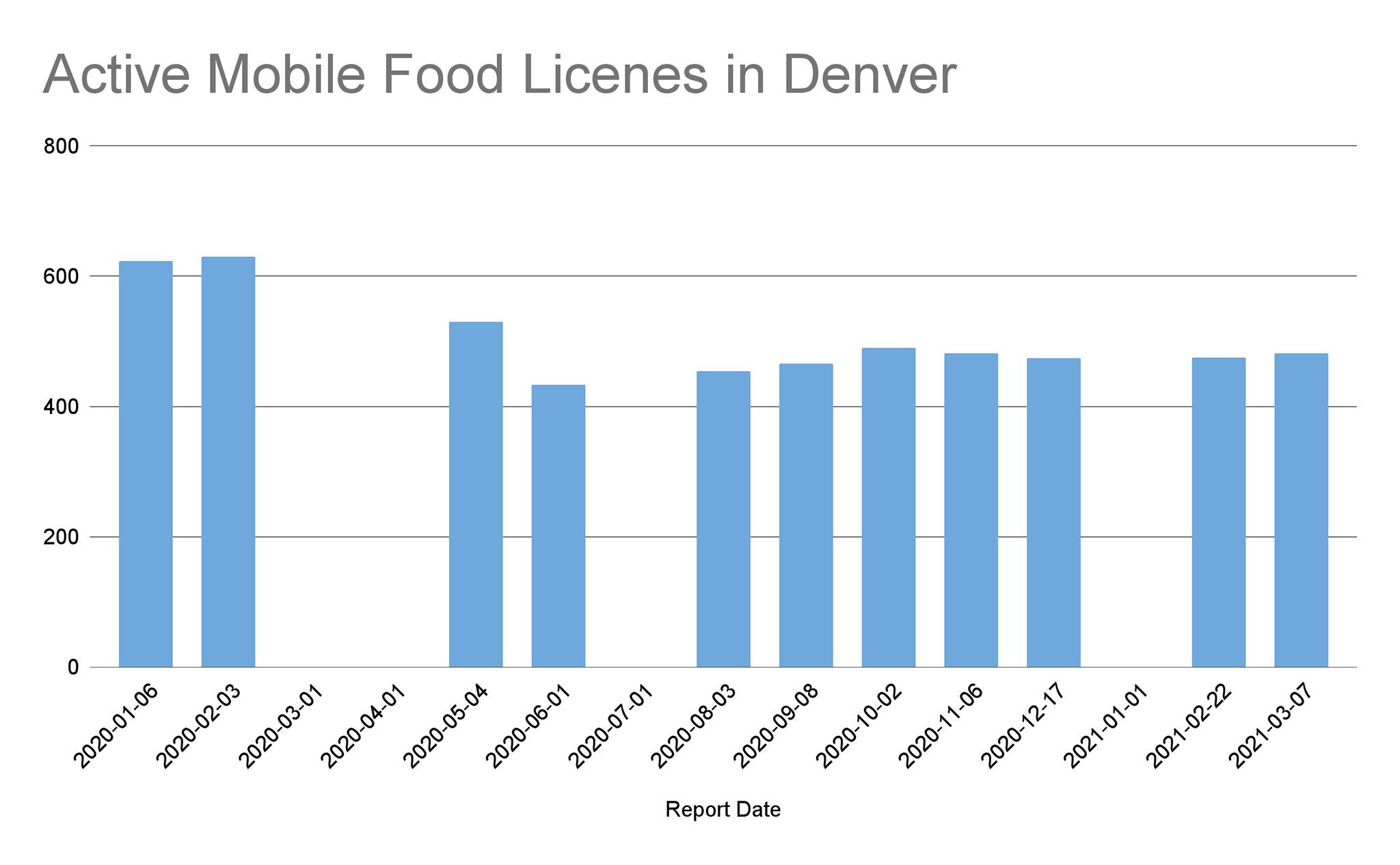
Source: Denver Department of Excise & Licenses
This category encompasses food trucks, paleteros, hot dog carts and the like.
To get the story behind one of the expired licenses reflected here, we visited Tocabe, An American Indian Eatery near the corner of West 44th Avenue and Lowell Boulevard.
Owner Ben Jacobs told us he and his business partner bought a food truck after their two brick-and-mortar locations were well established. When the restaurant's catering work grew beyond their expectations, they figured a mobile kitchen would be a more efficient way to take meals in bulk to their customers. It wasn't long before the truck became a staple at outdoor events, like City Park Jazz and the Denver March Powwow. Jacobs said it was often booked four or five days a week when the weather was nice.
The Powwow was the first major event to fall off his calendar when COVID arrived. The rest fell like dominos within the next few days.
"Everything through the year was canceled," he said. "We completely shut down the food truck. There wasn't any reason to take it out."
Jacobs let the Tocabe food truck license expire. The business owns the truck outright, and storage isn't too expensive, so it's not too big of a loss to let it sit dormant for a while. It may come in handy if he needs to sell it for some quick cash, but it's possible he'll get his paperwork renewed and hit the streets when public events become a thing again.
Pedicab licenses are down 83 percent.
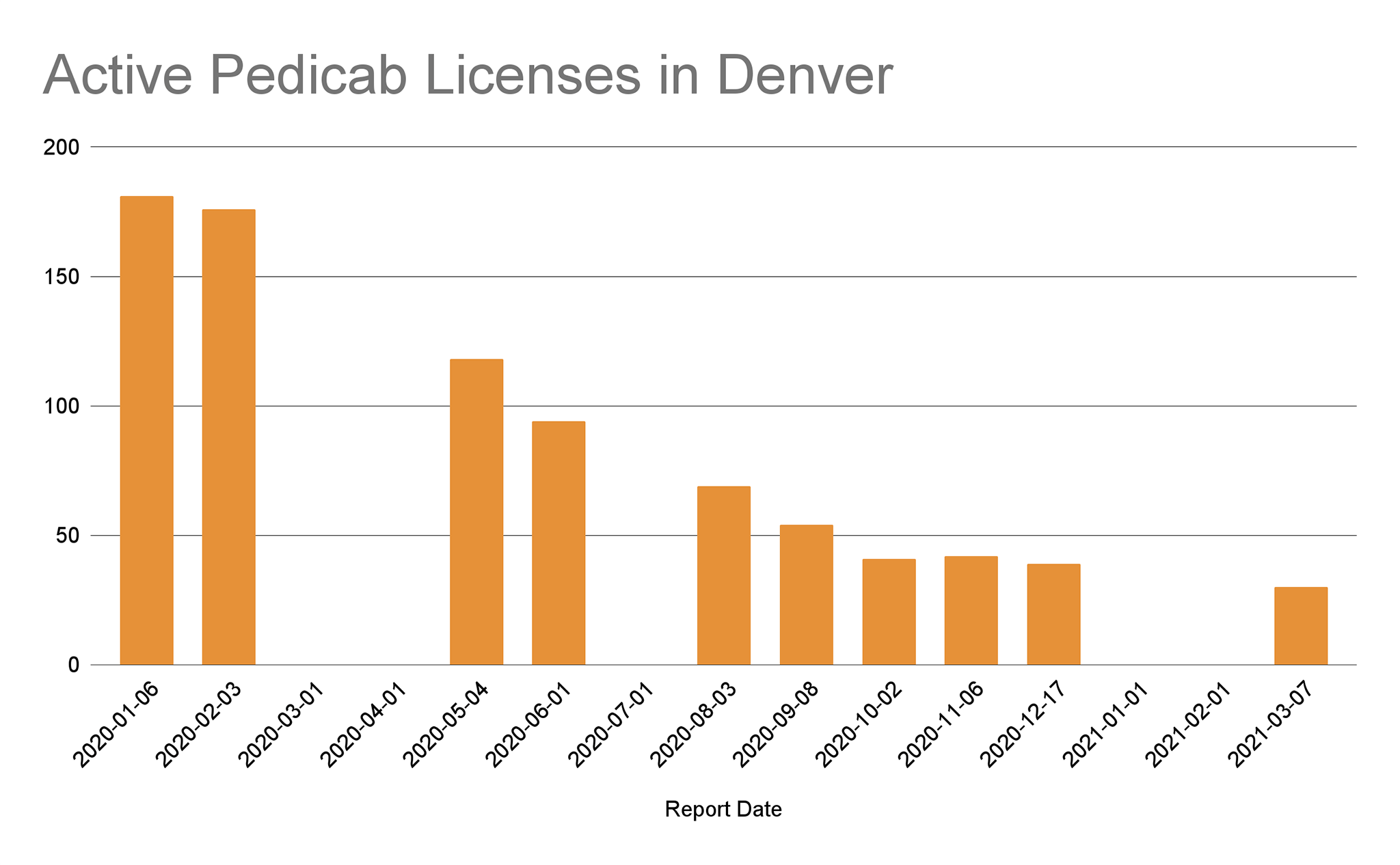
Source: Denver Department of Excise & Licenses
Brian McGinn owns 25 pedicabs, the bike taxis you may have seen downtown, and has been involved in this industry for a decade. He once leased his rigs out to drivers, and he loved cruising for passengers himself. A warm evening and a Rockies game usually made for great tips.
"Quite frankly, alcohol helps quite a bit. When guys are wining and dining a lovely lady they hope to take home that night," he reminisced, "she's been dancing the night away in high heels: Yeah, he's gonna flag a pedicab and he's gonna drop $20 on us."
Not so much during the pandemic. McGinn was not surprised when he heard how many of his biking comrades let their licenses expire. Like food truck operators, pedicab drivers rely on dense gatherings to make their bread.
Plus, he said, a lot of them are young. He suspects they have other job prospects.
"These kids would rather go out and trim marijuana," he said.
McGinn let his license expire, too.
"I didn't bother," he told us. "It made no sense to me."
He's been shifting his energy to other ventures, like a home inspection business he kicked off this week. But it's not too expensive to renew, and he still likes to ride. When fans are allowed to enter Coors Field again, he figures he'll probably want to take a cab down to the ballpark to rustle up some beer money.
Here are three other industries that became less active in the last year:
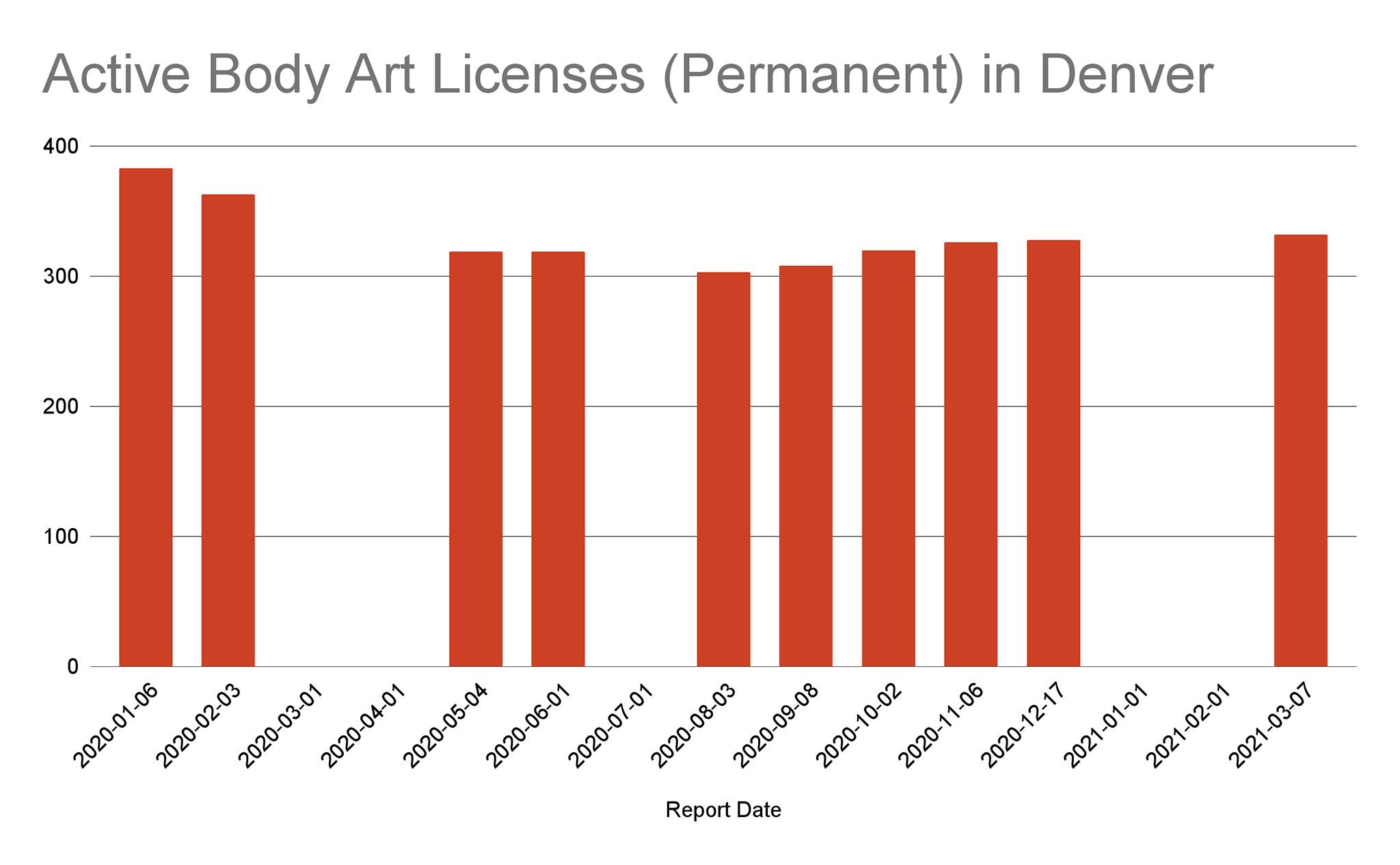
Source: Denver Department of Excise & Licenses
The body art licenses charted here are for people who practice body piercing and tattooing, though not ear piercing, and work at a licensed body art business. These licenses were down 13 percent between March 2021 and January 2020.
There's another category for people who want to do this stuff at one-time events, outside of places like tattoo parlors. Kimberley Zubia, a data analyst with Denver Excise and License, told us this category for "temporary licenses" all but vanished in 2020. There were only seven new applications for a temporary body art license last year, down from 707 in 2019.
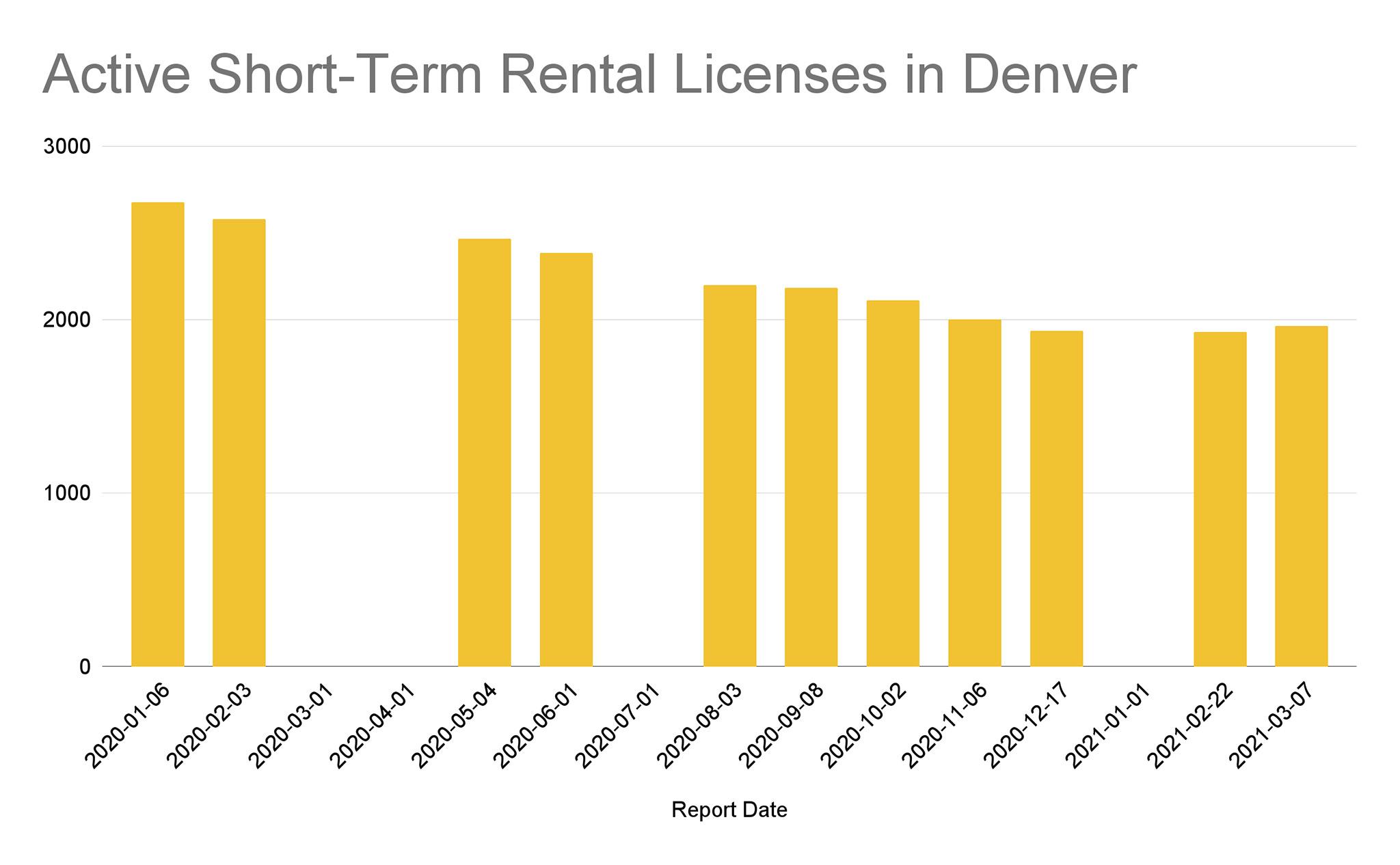
Source: Denver Department of Excise & Licenses
Short-term rental licenses dropped 26 percent between March 2021 and January 2020. These are required for people who rent rooms or ADUs through services like Airbnb.
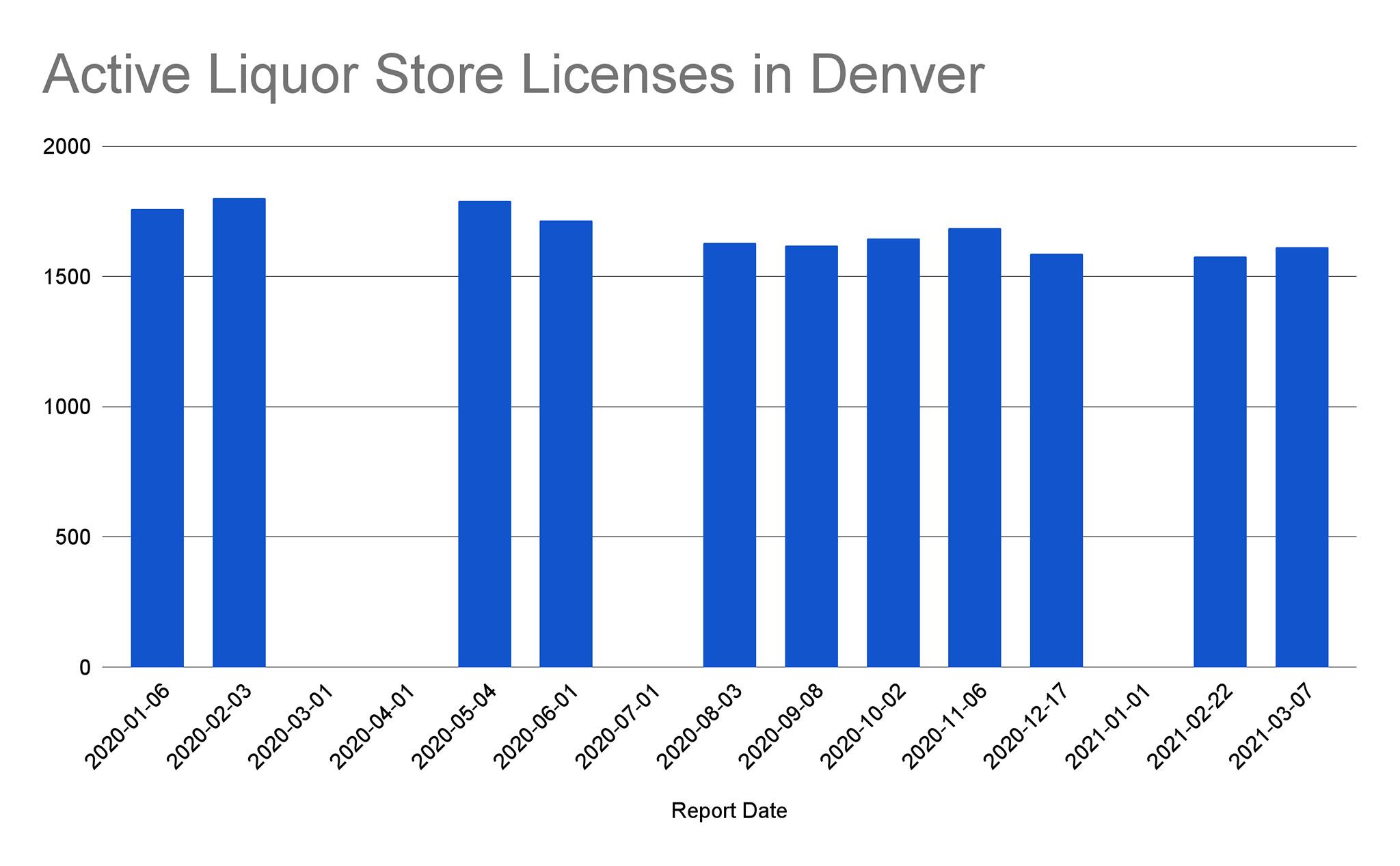
Source: Denver Department of Excise & Licenses
Active liquor store licenses were down 8 percent between March 2021 and January 2020. This may seem unlikely, given how people had to shift their drinking habits to their homes over the last year. But Raju Gautam, owner of Oneida Liquors in southeast Park Hill, told us that a lack of parties, fewer holiday gatherings and "with the Broncos going down hill," he earned less revenue in 2020 than he expected.
Two industries that held steady.
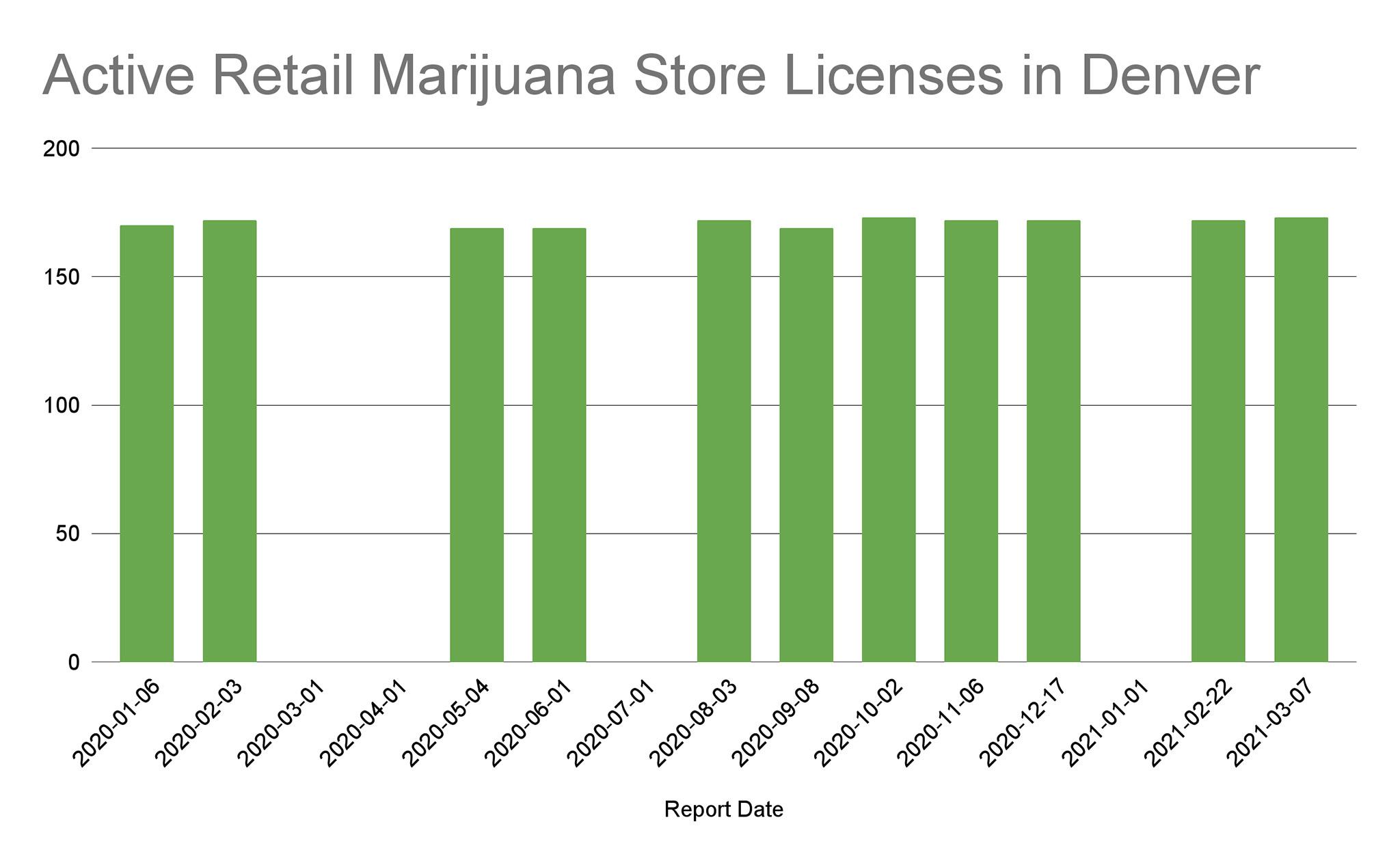
Source: Denver Department of Excise & Licenses
The number of brick-and-mortar stores that can sell marijuana in Denver stayed pretty much steady since January 2020, outperforming liquor stores.
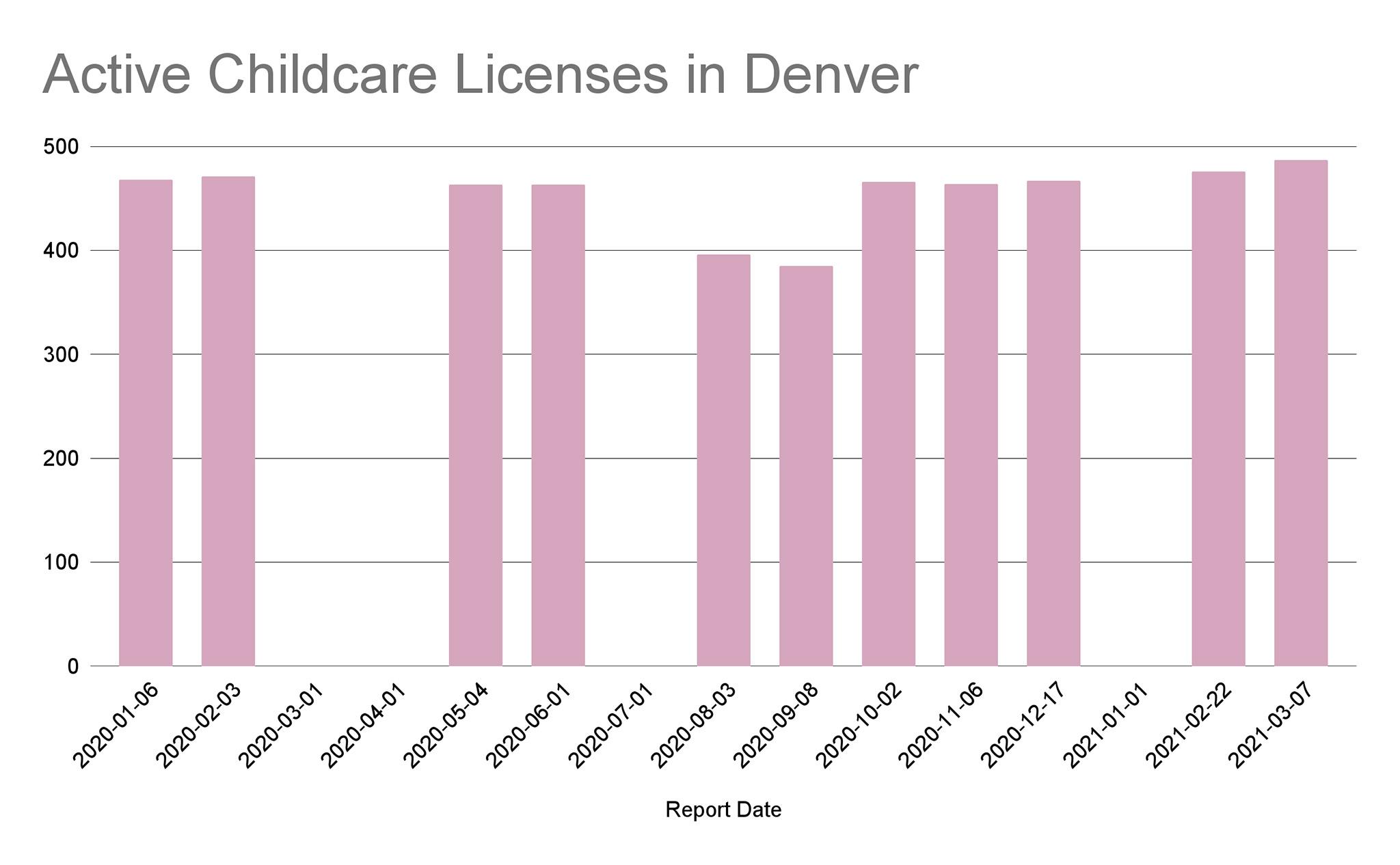
Source: Denver Department of Excise & Licenses
Active childcare licenses took a dip last autumn but rebounded quickly. The number of businesses allowed to watch kids - both in homes and in dedicated daycare facilities - was up 1 percent between March 2021 and January 2020.
Has your livelihood been impacted by the pandemic? We'd love to talk. Email Kevin at [email protected]!

